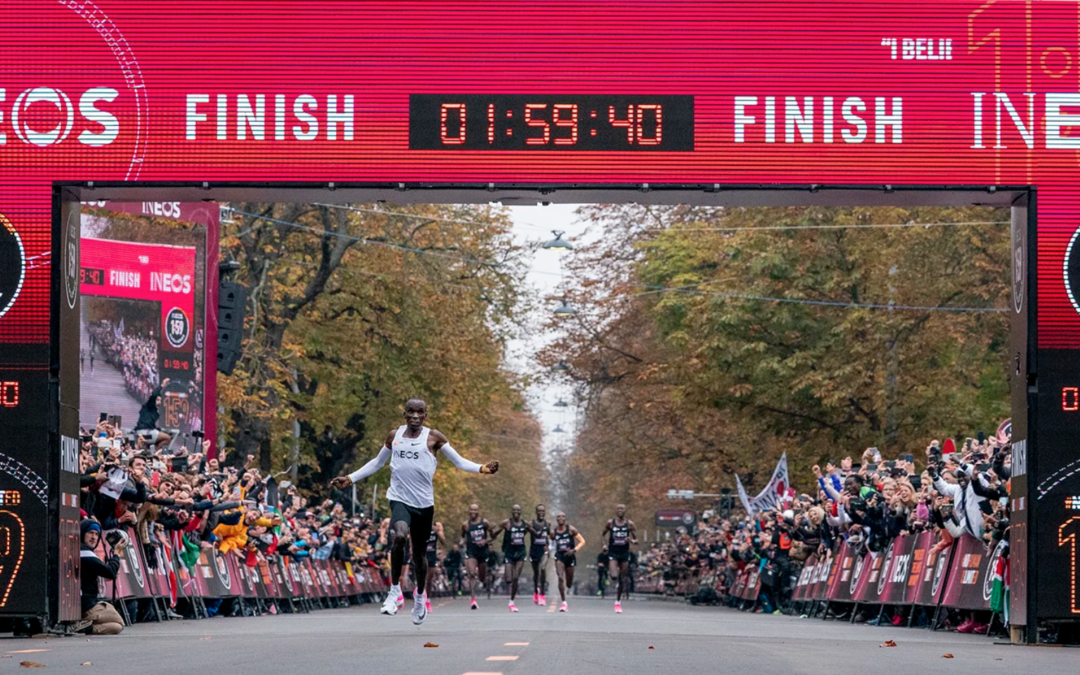
by Fredrick Nzwili, RNS | Oct 22, 2019 | Headline News |
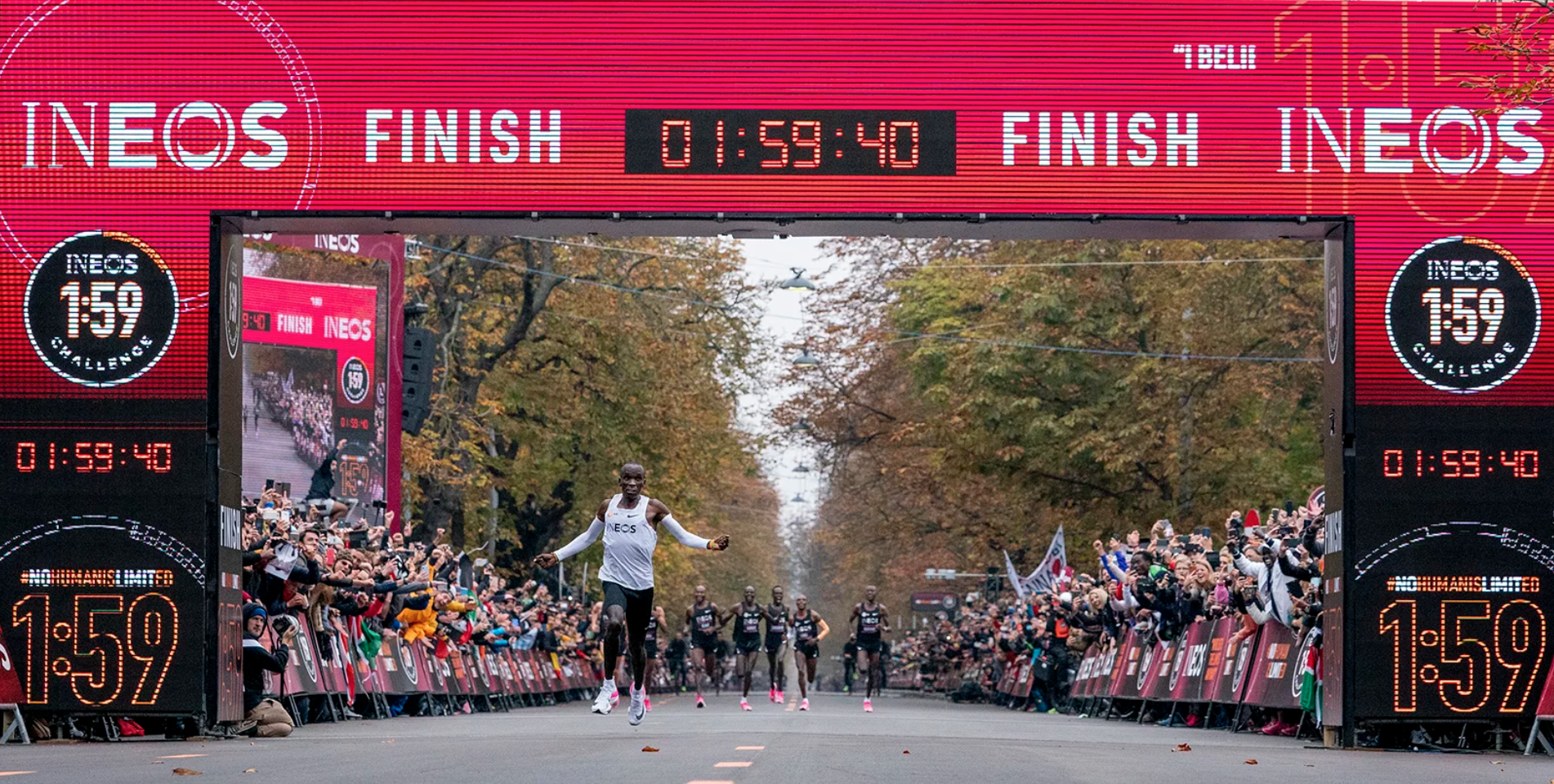
Eliud Kipchoge celebrates as he crosses the finish line Oct. 12, 2019, in Vienna to make history as the first human being to run a marathon in under two hours. (Bob Martin/The INEOS 1:59 Challenge via AP)
The two-hour marathon barrier has finally been broken. As Eliud Kipchoge arrived back home in Nairobi on Wednesday (Oct. 16), citizens of his country pointed at a “hand of God” in his record-breaking, sub-two-hour run on Saturday in Vienna.
Kipchoge, a Roman Catholic, ran the 42.2 kilometers (26.2 miles) in 1:59:40 in the race dubbed “No Human Is Limited.” He became the first runner in history to run the distance in under two hours. Later, the athlete compared the achievement to Neil Armstrong’s landing on the moon in 1969.
“I am … celebrating. I always celebrate in a calm and humane way,” said Kipchoge, after quietly reentering the country.
The race has united the people in villages, towns and cities in Kenya and stirred religious responses in the East African nation, where more than 80% of the population are Christians.
“I think he made it by trusting in God that all is possible,” the Rev. Nicholas Makau, a Roman Catholic priest in Nairobi, told Religion News Service. “He seemed (to) challenge a widely held view that humanity is limited, but he has shown that when people try, they can succeed.
“I think he is a religious person by upbringing who was doing it for his belief,” added Makau.
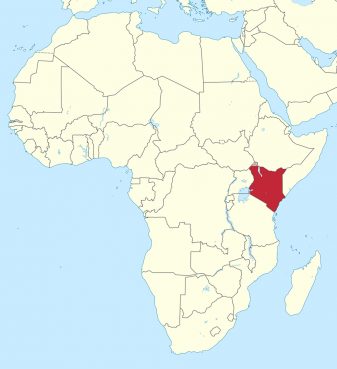
Kenya, in red, located in eastern Africa. Map courtesy of Creative Commons
The Rev. Wilybard Lagho, vicar general of the Mombasa Roman Catholic Archdiocese, followed the race from the coastal city of Mombasa.
“This means we can achieve more than we have always thought,” said Lagho. “Faith contributes to the success of human beings in mysterious ways we may not be able to quantify. But I think Kipchoge knows how to balance between spiritual and physical ability.”
The race has set a good example for humanity, said retired Anglican Bishop Julius Kalu of Mombasa, who keenly watched the race from the start.
“I was impressed by the pacesetters, who I think did a good job,” said Kalu, comparing their work to the call of Christians. “They supported Kipchoge to the end. This is what we should do as Christians — support each other in both good and bad times.”
Since the 1960 Rome Olympics, Kenyans have dominated long-distance running, from 800 meters to marathons, in the Olympics, World Cross Country Championships and the world road racing circuit.
The long distance running success has often stirred debates, with analysts citing physical attributes, the food and an ingrained culture of running. Recently, some religious analysts have also thrown in faith and ethics.
“The runners need their faith for endurance and perseverance, whether in training or in the actual race,” said Kalu.
In April this year, Kipchoge told Running Coach, a blog for runners, that religion played an important role in his life.
“It keeps me from doing things that could keep me (away) from my goals. On Sundays, I go to church with my family and I pray regularly, even in the morning before a race,” he said.
His latest race gripped the world as live coverage drew thousands of people to social and public places, including church centers in Kenya.
On Sunday, Kenyans went to church and thanked God for his achievement. They praised it as the work of a Christian role model.
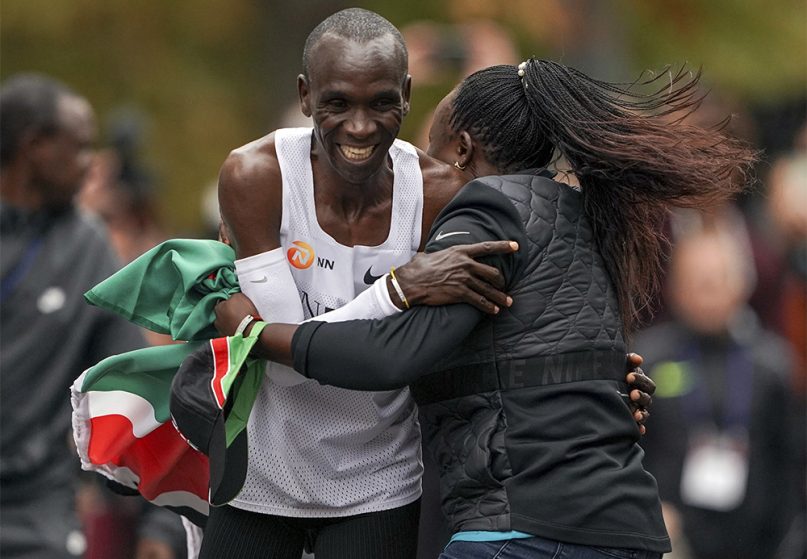
Eliud Kipchoge is hugged by his wife, Grace Sugutt, after breaking the historic two-hour barrier for a marathon on Oct. 12, 2019, in Vienna. Kipchoge has become the first athlete to run a marathon in less than two hours, although it will not count as a world record. The Olympic champion and world record holder from Kenya clocked 1 hour, 59 minutes and 40 seconds Saturday at the INEOS 1:59 Challenge, an event set up for the attempt. (Jed Leicester/The INEOS 1:59 Challenge via AP)
Even before Kipchoge left Kenya, Christians converged in churches to pray for the success of the race.
The St. Paul’s University Catholic Chapel at the University of Nairobi held special prayers for Kipchoge. The choir wore black and yellow T-shirts with inscriptions INEOS 1.59, the name of the challenge.
His elderly mother also watched with keen interest.
“I prayed and fasted for him so that he achieves what God had planned,” Jane Rotich told the Kenyan newspaper The Standard soon after the race.
She said she had been waking up every morning at 3 a.m. to pray for her son.
Kipchoge, who even before this race held the world record in the marathon, is one of Kenya’s most consistent marathon runners. He has participated in 11 marathons and won 10 of them, including the 2016 Olympic marathon. He has come oh-so-close to finishing several marathons in under two hours. In 2017, in Italy, he came within 25 seconds of the two-hour mark. And in Berlin in 2018, he was just 1 minute and 29 seconds over.
However, the record-breaking run in Austria on Saturday will still not count as a record. The “race” was designed specifically for Kipchoge and for the goal of finishing in under two hours. There were no other competitors in the run, the date was chosen for optimal weather, and he was supported by a rotating team of pacesetters as well as a car that used lasers to show the best place to run. These advantages are not allowed during typical marathon running and will keep this achievement off any official records.
But, according to the runner, that was not his goal. He wanted, simply, to see if it could be done. In his tweet before the race, Kipchoge wrote: “I don’t know where the limits are, but I would like to go there.”
“I expect more people all over the world to run under 2 hours after today,” he said after the race.
Kipchoge hopes to run in the Olympics in Tokyo next year and improve his world record — and perhaps, finally, get an official sub-two-hour marathon on the books.
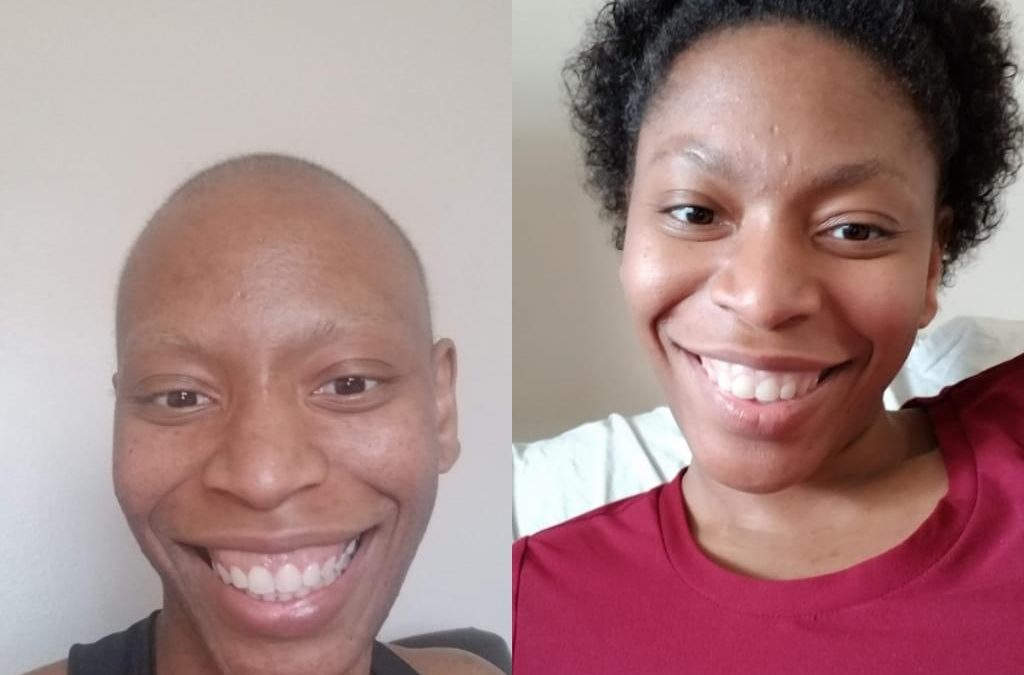
by Sonja Summers, Ed.D., Urban Faith Contributing Writer | Oct 22, 2019 | Headline News |
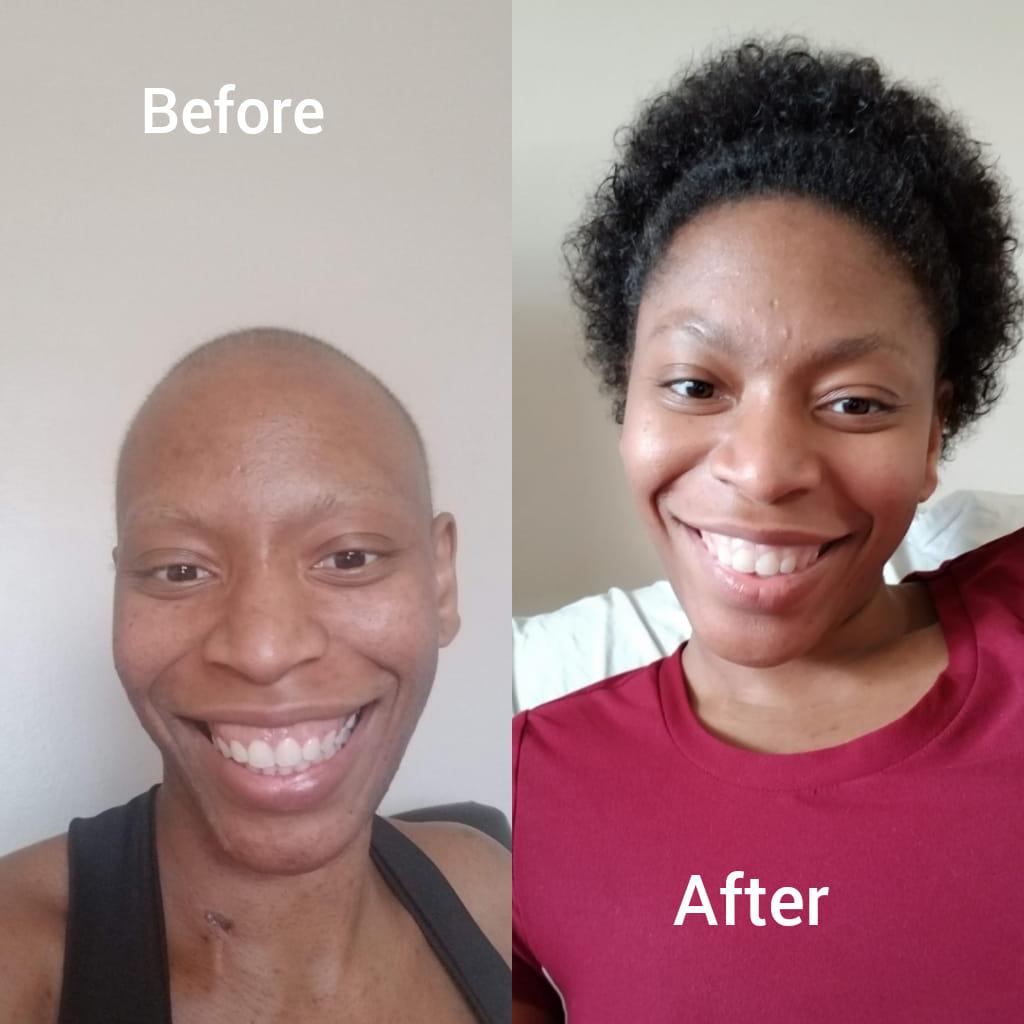
Jasmine Nichol Tate
While enjoying a date night with my spouse at the Orpheum Theatre to see “Tyler Perry’s Medea’s Farewell Play Tour,” I met Jasmine Nichol Tate, a young lady with a beautiful smile who was seated next to me. We exchanged pleasantries and chatted a bit before the performance began. She mentioned that she had traveled to this event to celebrate with her mother, who was quietly seated next to her. During the intermission, we continued our conversation. She further shared with me her life-long challenge with Sickle Cell Anemia, but her reason for celebrating this particular occasion was for another issue. Jasmine was recovering from a mastectomy and had just recently completed a series of chemotherapy.
Jasmine was diagnosed with breast cancer at the age of 23 years old. But on this occasion, she was excited about feeling good enough to take this trip to have fun with her mom. My immediate feeling of sadness had no time to settle in as her engaging smile and excitement charged our personal space. Perhaps she had explained her circumstances too many times before that it resembled a sermonette. I listened to her story with my heart, and this compelled me to seek meaning in her truth. Not only did I realize that any test in life can accompany a blessing, I now know that life’s challenges can renew our spirit bringing lessons and new beginnings. Hopefully, I can share this beautiful miracle and inspiring message in a little neatly wrapped package, as Jasmine managed to do.
Discovery: The Storm
Simply preparing for what Jasmine describes as an ordinary day, she remembered to do breast self-examination. She mentioned her awareness of the importance of this routine. However, on this specific day, she felt something odd that seemed to be a lump. During a follow-up visit to her doctor who normally treats her for Sickle Cell disease, further inquiries were conducted, but ultimately, she was sent home with no answers. Later as the pain worsened in that area of her body, she knew that what she was experiencing was certainly not normal. It’s as if she developed a sixth sense to visit another doctor, her OB-GYN, as soon as possible.
She recalled having to insist that this medical staff listen and give their full attention to her complaints and concerns. A referral was issued to continue more testing at the Breast Center Clinic, where both an ultrasound and a mammogram were performed. To her surprise, the results were labeled “undetermined.” Unsettled with these findings, she was offered a third option. A biopsy procedure was done. This exam revealed that indeed, there was cancer detected in her left breast. Jasmine explained that on Tuesday, August 1, 2017, the day that she was given her diagnosis, became “the day her life changed forever.” This news was devastating, especially to a Sickle Cell Anemia patient. What else could happen? Where was God in all this?
Treatment: A Turbulent Eye-Opening Experience
There were many decisions to be made regarding the methods for her treatment. Included in her many choices, were the willingness to have faith or fear what was happening to her. One ray of hope which emerged was early detection. Jasmine’s saving grace as a survivor was God’s guiding hands in the ordeal. Critical to surviving was “finding her cancer in its early stages.” She knows that this really does save lives; therefore, routine exams are essential. Even having taken these precautions, she was not spared from the physical and mental agony of a mastectomy and chemotherapy in addition to a flu virus. Her fear of uncertainty lingered with hair loss, recurring bouts with her Sickle Cell disease, and lengthy hospital stays. As if this was not enough, the situation progressed. Her weakened immune system invited a staph infection. According to Jasmine, this was indeed in the “deathbed” category. It invaded her body for some time and caused a tsunami of medical complications. It was the perfect storm that placed her odds for survival unconscionably bleak. Yes, there was a great support system and its benefits, but the battle was personal.
Some storms come with more turbulence than others. At times it may seem that the mayhem within a storm captures our attention even more than the rain or lightning. Likewise, it just may be the havoc that occurs in our minds that causes us to seek shelter — this was Jasmine’s reality. What was totally out of her control had to rest within the shadow of the almighty God (Psalms 91:1). She found herself seeking that secret place in her soul. Realizing that her human reactions to her situation were only human instincts, they voided her thoughts about her purpose in this storm. It took some reflection time, but gradually, she began to embrace a new truth related to her life. As her body was changing, so were her mind’s eyes. Instead of only focusing on her pain and suffering, she felt the need to develop a more positive mindset. Maybe her current crisis was allowing her to learn how to redefine and discover herself as not just sick and vulnerable, but human. Eventually, she could see that her thoughts were helping her to transform purposefully. Perhaps she was not the victim as she had thought, but victorious. Every new day was another miracle of surviving and a reason to be hopeful. From what appeared to be a difficult experience with cancer and its unforeseen twists emerged a path to show her who she really could become and how she could best contribute to humanity. She practiced gaining a clearer focus, which contributed to her will to help others accept and respect the change in life as well. Could it be that through both prayer and praise, God had granted her a gift via her cancer ordeal?
The pain and the uncomfortable treatments continued, and there were many watershed moments, yet she learned that these moments were her body’s mechanisms for mental, physical, and spiritual cleansing. Throughout this healing process, there were revelations of how she could help others with her advocacy. No matter how uncertain things looked on some days, what was certain was that each passing day, she grew in her faith and hoped for a cure. During the discovery of her cancer, she felt that something was wrong. Now at this point, she saw that there was something right happening. By harnessing the realization that healing both from the outside with medicines to inside her mind was rejuvenating. The power of her mind shift was as necessary as the medical treatment that she was receiving.
Recovery: A Glimpse of Sunshine
Today, Jasmine lives cancer-free. Her acceptance of what exists in her life, along with lessons learned to fuel intimate gratefulness to God. The wisdom gained from her experience has become an unexpected welcomed blessing. As a breast cancer survivor, hope in her purpose to encourage others is limitless. Her journey remains a real eye-opening experience proving that everything in life possesses unique meanings. Seeing the world through new lenses helps to appreciate days that are no longer consumed by “what ifs” regarding cancer, but her “what is” concerning her life. For Jasmine, learning to differentiate grief from grace is a continuous part of healing. Somewhere in the middle, she has found purpose in ways that encourage us all to learn to trust our journey and its processes. She urges us to seek wisdom to manage all parts of life through our faith, especially things that we cannot control.
Negativity is its own disease. Therefore, attitude plays a significant role in rising above any challenge, because you can then begin to recognize that in life, everything seems to be a miracle. Jasmine strongly affirms that “I know that I’ve beat breast cancer” as she prepares to complete the next phase of breast surgery to replace a tissue expander with the actual breast implant. Enthusiastically, she says, “being challenged and pushed to my limit developed new perspectives of what is less fatal, but more important.” Her perspective on faith and hope is staying positive and to smile through storms. There is profound meaning in the portion of the Lord’s prayer, which requests God to “give us our daily bread (Matthew 6:11).” This bread for Jasmine represented the gift of empathy in that it is her understanding to see people, things, and circumstances from different points of view. Avoid worrying about issues that rob you of your peace. Teach yourself to let go of stuff not significant enough to hold in your mind-space. It’s only stuff, the extra baggage that may have kept you stressed in the first place. It tends to bring you “peace that passes all understanding” that believers often speak of in (Philippians 4:6-7).
Second, only to trust that God holds the first and last words over our lives, it is necessary to know that education is the key to surviving. Take time to learn about your body, for no one knows its changes, pain, or discomfort better than you. Trust your gut feeling, for it can be God’s message to you. Use both your physical and common senses by remaining persistent, asking questions, and becoming proactive. Remain curious about that which concerns you and learn how to interact with medical professionals effectively. One opinion from a single individual may not be the absolute answer for you. Celebrate you!
This was her reason for traveling to celebrate on the evening we met. At that time, I did not immediately see the scope of the grandness in her bright smile when we encountered each other. Upon reflection, her eyes were like a ray of sunshine, showing me a glimpse into her soul. Her story may seem fairly typical to many, but to me, the richness of meeting her was in divine order. It was a wake-up call filled with life’s truths to ponder from this day forward. As directed in Proverbs 3:5-6, we must remind ourselves to “trust in the Lord and lean not to our own understanding, but acknowledge Him in all things, and He shall direct our paths.”







